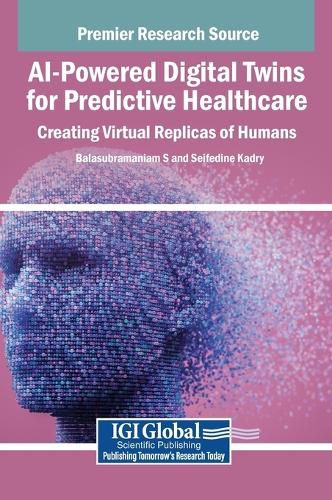Readings Newsletter
Become a Readings Member to make your shopping experience even easier.
Sign in or sign up for free!
You’re not far away from qualifying for FREE standard shipping within Australia
You’ve qualified for FREE standard shipping within Australia
The cart is loading…






This title is printed to order. This book may have been self-published. If so, we cannot guarantee the quality of the content. In the main most books will have gone through the editing process however some may not. We therefore suggest that you be aware of this before ordering this book. If in doubt check either the author or publisher’s details as we are unable to accept any returns unless they are faulty. Please contact us if you have any questions.
AI-powered digital twins for predictive healthcare may revolutionize monitoring, diagnosis, and treatment of health conditions. By leveraging AI, machine learning, and data, to utilizing wearable devices, medical imaging, genetic profiles, and clinical records, digital twins can simulate a wide range of health scenarios and predict outcomes with accuracy. This innovation allows for proactive, individualized care by forecasting disease risks, optimizing treatment plans, and enabling real-time health monitoring. AI-driven digital twins offer insights into how various treatments, environmental factors, and lifestyle changes might affect long-term health. As healthcare becomes data-driven, the potential of AI-powered digital twins to transform patient care may reduce hospital admissions, improve outcomes, and reshape the future of medicine. AI-Powered Digital Twins for Predictive Healthcare: Creating Virtual Replicas of Humans explores the science, technology, and real-world applications behind digital twins. It examines how these digital replicas are used for predictive healthcare, accelerating drug discovery, simulating surgical outcomes, and personalizing therapeutic interventions based on real-time, AI-driven insights. This book covers topics such as digital twins, healthcare monitoring, and ethics and law, and is a useful resource engineers, healthcare professionals, academicians, researchers, and scientists.
$9.00 standard shipping within Australia
FREE standard shipping within Australia for orders over $100.00
Express & International shipping calculated at checkout
This title is printed to order. This book may have been self-published. If so, we cannot guarantee the quality of the content. In the main most books will have gone through the editing process however some may not. We therefore suggest that you be aware of this before ordering this book. If in doubt check either the author or publisher’s details as we are unable to accept any returns unless they are faulty. Please contact us if you have any questions.
AI-powered digital twins for predictive healthcare may revolutionize monitoring, diagnosis, and treatment of health conditions. By leveraging AI, machine learning, and data, to utilizing wearable devices, medical imaging, genetic profiles, and clinical records, digital twins can simulate a wide range of health scenarios and predict outcomes with accuracy. This innovation allows for proactive, individualized care by forecasting disease risks, optimizing treatment plans, and enabling real-time health monitoring. AI-driven digital twins offer insights into how various treatments, environmental factors, and lifestyle changes might affect long-term health. As healthcare becomes data-driven, the potential of AI-powered digital twins to transform patient care may reduce hospital admissions, improve outcomes, and reshape the future of medicine. AI-Powered Digital Twins for Predictive Healthcare: Creating Virtual Replicas of Humans explores the science, technology, and real-world applications behind digital twins. It examines how these digital replicas are used for predictive healthcare, accelerating drug discovery, simulating surgical outcomes, and personalizing therapeutic interventions based on real-time, AI-driven insights. This book covers topics such as digital twins, healthcare monitoring, and ethics and law, and is a useful resource engineers, healthcare professionals, academicians, researchers, and scientists.